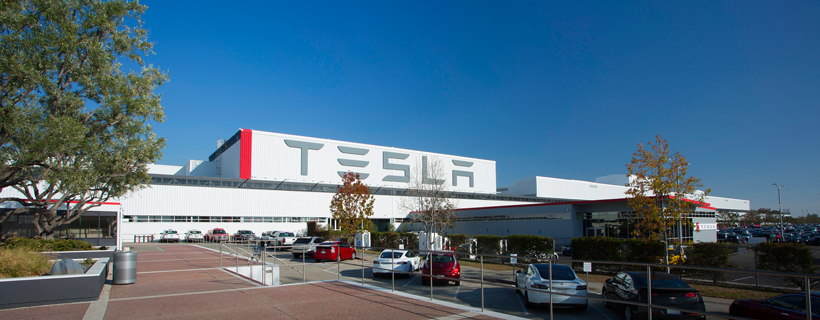Bottom Line: Tesla’s market cap has nearly doubled over the last month and has tripled since the end of Q3. The excitement driving such a dramatic rise presents short term risk. We believe current pricing may be overlooking:
- Sequential delivery decline
- Negative free cash flow
- Margin pressure from production ramps and fewer deliveries
The market has fundamentally repriced Tesla as a technology company with a market cap of $136B, more than the Big 3 US automakers combined (GM $50B, Ford $34B, Fiat Chrysler $27B). Tesla shares dropped 17% to $734 on Wednesday, coming back to earth after a meteoric run up to $969.
Tesla’s Q4 was a golden holiday quarter full of tailwinds. Notably, deliveries outpaced production by 7k vehicles, fueling a FCF beat of 133% ($429M street vs $1B actual). As tailwinds shift to headwinds in Q1, we believe expectations have risen too quickly ahead of Q1 results. We believe the repricing is justified, but caution that the Street is overlooking the following short-term headwinds:
- Q4 demand pull-forward from incentive phaseouts in the US & Netherlands. Potential buyers were incentivized to purchase Tesla vehicles in Q4, as the effective price of a base Model 3 in the US increased from $38,025 to $39,900. Tesla did not reduce prices to offset the tax credit phaseout, which is an indication of strong demand. Interest in Tesla is at an all-time high, which helps vehicle demand.
- Tesla removed “Deliveries should increase sequentially” from the Q4 shareholder letter. In both Q2 and Q3, Tesla’s Delivery Outlook read, “Deliveries should increase sequentially and annually, with some expected fluctuations from seasonality.” The removal likely indicates Q1 deliveries will decline significantly from 112k vehicles in Q4. Tesla Q4 Volume Outlook: “Due to ramp of Model 3 in Shanghai and Model Y in Fremont, production will likely outpace deliveries this year.” Throughout its history, Tesla has never delivered more vehicles than it has produced in Q1. Vehicle production will likely outpace deliveries significantly in Q1, which may lead to negative FCF for the quarter.
- Q1 is seasonally weak for automakers due to poor weather, end of year holiday discounts, and new model releases. Tesla’s CFO: “For Q1, please keep in mind that the industry is always impacted by seasonality.” Tesla will not have to deal with the severe overseas logistics headwinds they experienced in Q1 ’19. However, the Street is likely underestimating the negative impact of Q1 seasonality.
- Finished vehicle inventory decreased sequentially from 17 to 11 days of sales. Q4 shareholder letter: “Our finished vehicle inventory levels reached just 11 days of sales at the end of Q4, the lowest level in the past 4 years.” Tesla delivered every vehicle they could in Q4, leaving many showrooms empty and online inventory searches yielding “no results”. Tesla will likely build vehicle inventory levels during Q1, which may widen the gap between vehicle production and deliveries, negatively impacting FCF and profitability.
- Model S&X Osborne effect due to upcoming “Plaid” Powertrain. Elon: “[The Plaid] Powertrain is like mind-blowing… Coming out later this year. That’s our goal. This is like alien technology. It’s insane.” Elon’s comments and the ever-present rumored interior “refresh” incentivize potential Model S & X buyers to hold out, which may lead to fewer Q1 deliveries than expected.
- Fremont Model Y and Shanghai Model 3 ramps. CFO: “We are in the process of ramping two major products, Model 3 in Shanghai and Model Y in Fremont, which I expect will temporarily weigh on our margin… We were negative gross margin on the products that we built in Q4. But the team in China, I think did a great job managing cost during the launch. And so, there was a slight drag associated with it, but not terribly significant.” Shanghai factory shutdown and negative/thin gross margins for China Model 3 and Fremont Model Y programs will negatively impact Q1 financials.
- Coronavirus impact on Shanghai production, Model 3 delivery delays, and Fremont supply chain. CFO: “We’re expecting a 1 to 1.5 week delay in the ramp of Shanghai-built Model 3 due to a government required factory shutdown. This may slightly impact profitability for the quarter.” Yesterday, Tesla executive Tao Lin said Chinese Model 3 deliveries scheduled for early February will be delayed until the coronavirus outbreak situation improves. Tesla’s Shanghai factory has been closed since January 25th, the Lunar New Year, and creates uncertainty around Q1 vehicle production and deliveries out of China, further pressuring profitability on lower production.
